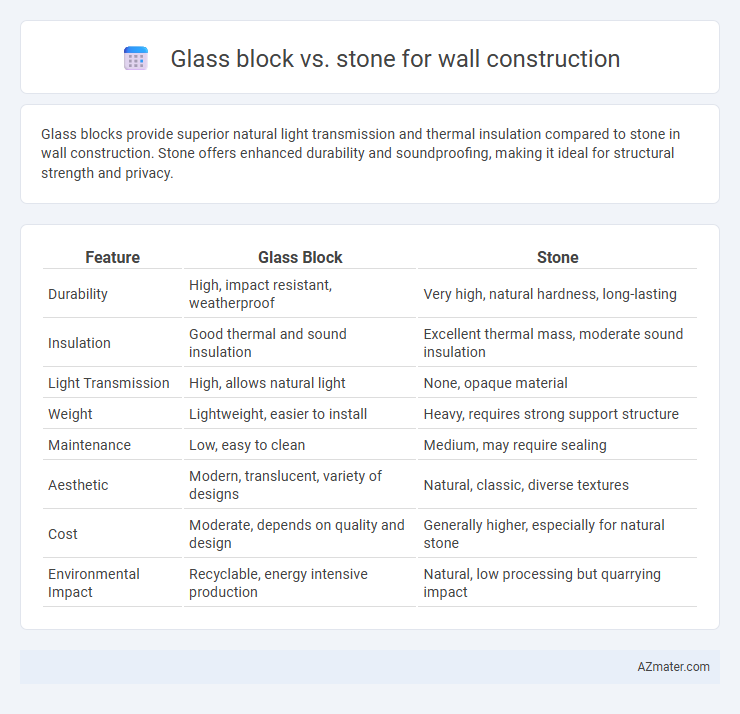Glass blocks provide superior natural light transmission and thermal insulation compared to stone in wall construction. Stone offers enhanced durability and soundproofing, making it ideal for structural strength and privacy.
Table of Comparison
| Feature | Glass Block | Stone |
|---|---|---|
| Durability | High, impact resistant, weatherproof | Very high, natural hardness, long-lasting |
| Insulation | Good thermal and sound insulation | Excellent thermal mass, moderate sound insulation |
| Light Transmission | High, allows natural light | None, opaque material |
| Weight | Lightweight, easier to install | Heavy, requires strong support structure |
| Maintenance | Low, easy to clean | Medium, may require sealing |
| Aesthetic | Modern, translucent, variety of designs | Natural, classic, diverse textures |
| Cost | Moderate, depends on quality and design | Generally higher, especially for natural stone |
| Environmental Impact | Recyclable, energy intensive production | Natural, low processing but quarrying impact |
Introduction to Glass Block and Stone Walls
Glass block walls offer translucent, light-enhancing benefits with excellent thermal insulation and moisture resistance, making them ideal for modern architectural designs. Stone walls provide superior structural strength, natural durability, and timeless aesthetic appeal, commonly used in traditional and rustic constructions. Both materials serve distinct functional and visual purposes, with glass blocks emphasizing light diffusion and stone walls prioritizing robustness and weather resistance.
Material Composition and Properties
Glass blocks consist primarily of silica-based glass, offering high translucency and excellent light diffusion, making them ideal for natural lighting in wall construction. Stone, composed of natural minerals such as granite, limestone, or sandstone, provides superior structural strength, durability, and thermal mass, enhancing insulation and load-bearing capabilities. Glass blocks are resistant to moisture and corrosion but have lower impact resistance compared to stone, which excels in weather resistance and longevity in exterior applications.
Aesthetic Appeal and Design Flexibility
Glass blocks offer a unique aesthetic appeal by allowing natural light to filter through walls, creating a luminous and modern ambiance ideal for contemporary designs. Stone provides a timeless, natural texture with a wide range of colors and finishes, enhancing the visual depth and warmth of a structure. Design flexibility in glass blocks includes customizable shapes and translucency levels, while stone allows for varied patterns and masonry techniques, catering to both rustic and sophisticated architectural styles.
Structural Strength and Durability
Glass blocks offer moderate structural strength with excellent resistance to environmental damage, making them ideal for non-load-bearing walls where natural light and aesthetic appeal are prioritized. Stone walls, composed of materials like granite or limestone, provide superior structural strength and durability, capable of bearing heavy loads and withstanding harsh weather conditions over centuries. While glass blocks are more lightweight and require minimal maintenance, stone walls deliver unmatched longevity and robustness in construction projects demanding high structural integrity.
Thermal Insulation and Energy Efficiency
Glass blocks provide superior thermal insulation due to their hollow core design, effectively trapping air and reducing heat transfer compared to traditional stone walls. Stone, while durable, has higher thermal conductivity, leading to increased heat loss and reduced energy efficiency in building envelopes. Incorporating glass blocks in wall construction enhances energy savings by maintaining consistent indoor temperatures and reducing reliance on heating and cooling systems.
Light Transmission and Privacy
Glass blocks provide superior light transmission compared to stone, allowing natural light to permeate interior spaces while maintaining structural strength. Stone walls offer enhanced privacy and sound insulation due to their dense, opaque composition, effectively blocking visibility and noise. Selecting between glass block and stone depends on prioritizing either natural light diffusion or maximum privacy for wall construction projects.
Installation Process and Labor Requirements
Glass block installation requires precise alignment and sealing with mortar or silicone, demanding skilled labor familiar with handling fragile materials and ensuring proper waterproofing. Stone wall construction involves heavy lifting, cutting, and fitting irregular shapes or sizes, typically requiring more labor-intensive effort and specialized masonry skills to achieve structural stability and aesthetic consistency. Labor costs for stone walls are generally higher due to the complexity and physical demands of the installation process compared to the relatively faster assembly of glass blocks.
Maintenance and Longevity
Glass block walls offer low maintenance due to their resistance to moisture, mold, and staining, making them ideal for wet environments and easy to clean with minimal upkeep. Stone walls, while highly durable and long-lasting, require periodic sealing and inspection to prevent weathering, cracking, or biological growth such as moss and algae. Both materials provide extended longevity, but glass blocks typically reduce maintenance efforts, whereas stone demands regular care to preserve structural integrity and aesthetics over time.
Cost Comparison and Budget Considerations
Glass block walls typically have higher material costs ranging from $50 to $100 per square foot, primarily due to the specialized nature and aesthetic appeal. Stone walls, while varying widely based on type, generally cost between $30 and $70 per square foot, offering a more budget-friendly option but with increased labor expenses. Budget considerations should also factor in installation complexity, maintenance, and desired architectural impact, where glass blocks provide natural light and modern design but at a premium price compared to the durability and traditional look of stone.
Best Applications and Use Cases
Glass blocks excel in areas requiring natural light diffusion and privacy, making them ideal for bathroom walls, office partitions, and decorative facades. Stone is preferred for exterior wall construction due to its durability, thermal mass, and resistance to weathering, making it suitable for load-bearing walls and rustic architectural designs. Combining both materials can enhance aesthetic appeal and functionality in mixed-use spaces such as atriums or feature walls.

Infographic: Glass block vs Stone for Wall construction
 azmater.com
azmater.com